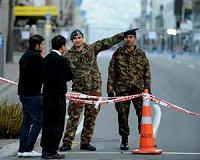| . |  |
. |
Las Vegas (AFP) May 19, 2011 Japanese business leaders launched a campaign Thursday to woo tourists back to Japan after the devastating earthquake, tsunami and nuclear disaster that sent foreigners fleeing the country. "I would like to say: Japan is safe," said Atsutoshi Nishida, the chairman of Toshiba, told a high-powered gathering of travel and tourism executives and officials from around the world. Accepting the group's invitation to host the next Global Travel and Tourism Summit in Tokyo in April 2012, Nishida said he hoped to welcome participants to a Japan at "full strength" by then. International travel to and from Japan plunged after the 9.0 magnitude quake March 11 off Sendai, Japan that sent a tsunami surging through nuclear power complexes along the coast, magnifying a disaster that killed 15,000 people. While tourism represents only a small part of economy impacted, it is an important bellwether of confidence in Japan. In the immediate aftermath of the quake, the number of tourists arriving in the country dropped by more than 50 percent, and leisure travel collapsed by 90 percent, according to the Japanese Tourism Agency. Japanese departures from the country were estimated to have fallen by 18 percent in March from the same month in 2010. There were tentative signs of recovery in May, and Japanese officials said that travel during the Golden Week holiday in late April and early May when Japanese celebrate their famed cherry blossoms, were better than expected. But Oxford Economics, in a study released here Thursday, said the experience after other major disasters shows it can take as long as two years to get back to normal. "Recovery rates depend not only on the extent of the damage caused but political support to rebuild infrastructure and promote travel and tourism, and crucially on the perception left on the traveling public by the disaster," it said. It said it took four years for New Orleans to return to baseline levels of tourism after Hurricane Katrina. Japanese officials said their campaign to bring back tourism will begin with education campaigns to dispell what they say are public misperceptions about the effects of the nuclear disaster. Only later will they proceed to ad campaigns and the like to get tourists to come back, they said. Naoyoshi Yamada, of the Japan Tourism Agency, said the government has budgeted seven billion yen, or about 75 million dollars, this year for the effort. It was clear from their presentations here that the Japanese representatives see fears over the lingering effects of the nuclear crisis as the biggest hurdle to overcome. Nishida contended it was misleading to put the crisis at Japan's Fukushima nuclear complex on a par with the 1986 Chernobyl disaster, telling reporters the release of radiation in that meltdown "dwarfed" the amounts released in Japan. He said Japan's top rating of seven on the International Nuclear Event Scale, equal to that of Chernobyl disaster, "has made many people nervous about visiting Japan." He said the levels radioactive material in Tokyo drinking water have remained within allowable limits for adults from the start of the crisis, and he said Japan's standards were stricter than those of the European Union. "By EU standards, there is absolutely nothing to worry about," he said. He said food in shops and restaurants were "safe to eat," and there was no reason to worry about radiation levels outside of the immediate evacuation zone around the stricken reactors. Despite the destruction caused by the quake, Nishida said, visitors can travel around Japan with ease. High speed rail travel has been restored, and the damaged Tohoku Expressway to the north has reopened, he said. "Consumer confidence is on the way to full recovery, by summer I hope," he said.
Share This Article With Planet Earth
Related Links Bringing Order To A World Of Disasters A world of storm and tempest When the Earth Quakes
 Quake-hit New Zealand takes axe to public services
Quake-hit New Zealand takes axe to public servicesWellington (AFP) May 19, 2011 New Zealand said Thursday it would cut public service spending and partially privatise state-owned assets to help pay for devastating Christchurch earthquakes and kickstart the flagging economy. Unveiling his annual budget, Finance Minister Bill English said the damage from the quakes in September and February was NZ$15 billion ($11.8 billion), equivalent to eight percent of New Zealand's gr ... read more |
|
| The content herein, unless otherwise known to be public domain, are Copyright 1995-2010 - SpaceDaily. AFP and UPI Wire Stories are copyright Agence France-Presse and United Press International. ESA Portal Reports are copyright European Space Agency. All NASA sourced material is public domain. Additional copyrights may apply in whole or part to other bona fide parties. Advertising does not imply endorsement,agreement or approval of any opinions, statements or information provided by SpaceDaily on any Web page published or hosted by SpaceDaily. Privacy Statement |